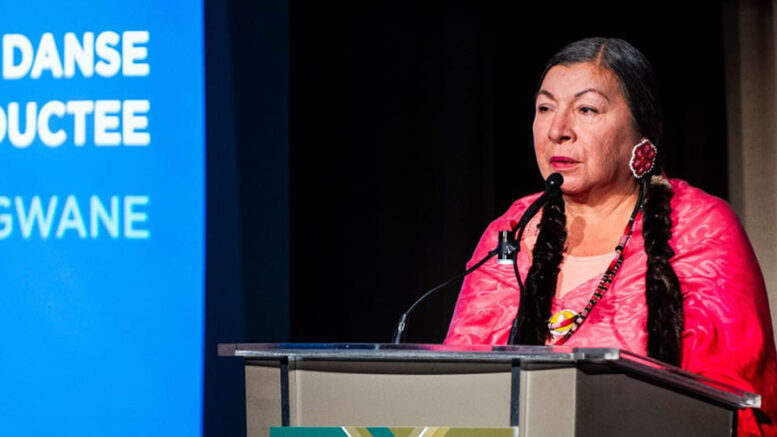By Chevi Rabbit, Local Journalism Initiative Reporter
(ANNews) – In a landmark moment for Indigenous culture, Karen Pheasant-Neganigwane, an Anishinaabe dancer, scholar, and author from Toronto; the Three Fires Confederacy, Wiikwemikoong, Manitoulin Island, Ontario, has marked a historic achievement as the first traditional Powwow dancer to be honoured with induction into the prestigious Canadian Dance Hall of Fame (CDHF). Karen’s journey, rooted in Rochdale College’s social project in Toronto, sparked a lifelong commitment to activism and scholarly pursuits. There have been other Indigenous inductees, but Karen is the first Traditional Powwow dancer to be given the distinction.
Karen shares, “I was so emotional,” revealing that the news resonated beyond a personal level, delving into the challenges faced by those who dared to dance and echoing the history of Indigenous resilience.
Enshrined in the Canadian Dance Hall of Fame, Karen’s story unfolds as a crucial chapter in the broader narrative of Powwow’s resilience. Despite oppressive measures under the Indian Act from 1876 to 1951, Powwows endured in secret, experiencing a resurgence during the rise of Indigenous rights movements.
Encouraging exploration, she urges readers to delve into oppressive measures outlined in her book ‘Powwow: A Celebration Through Song and Dance,’ shedding light on historical challenges like the 1921 Duncan Campbell Scott letter aimed at suppressing Indigenous dances beyond reserves. Her book also was recipient of the Norma Fleck Award for Best Canadian Children’s Non-Fiction Book in 2021.
While residing in Alberta, Karen connects to Manitoulin, attributing her dance grounding to the time invested in Treaty 6, Treaty 7 and Treaty 3 Territories. Her Western education, including a B.A. in Political Science and English Literature, converges in ongoing Ph.D. studies in Educational Policy Studies/Indigenous Peoples Education at the University of Alberta. As an Assistant Professor at Mount Royal University, she actively shapes the narrative in Indigenous Studies.
Born and raised in Toronto, she navigated the Powwow circuit guided by mentors like Pauline Shirt and René Highway, challenging stereotypes and proving that cultural roots thrive even in urban landscapes.
Sharing her emotional response, Karen unveils the dedication required for Powwow dancing, shedding light on the lifestyle commitment it takes to be a Powwow dancer. She said, “I spent decades upon decades dancing on the harbor… People in Montreal, Vancouver, and Toronto, they don’t know, don’t get it,” emphasizing the commitment and connection to the earth that traditional dancers possess as the dance originates on turtle island.
She says, “As a traditional jingle dress dancer in Powwow, my dance has always been finding my true self… and has been part of my healing salve,” linking her journey to the broader context of Indigenous healing from the impacts of colonialism.
Reflecting on her emotional response, Karen shares, “My grandparents were born in the 1880s, so my grandparents and my parents were raised with that mindset: you cannot dance.”
“As a traditional jingle dress dancer in Powwow, my dance has always been a journey of self-discovery and a crucial part of my healing process,” emphasizes Karen. Describing her Ph.D. research on the impact of colonialism on the soul, she shares, “Through my dissertation, I uncovered the pain that I hadn’t realized before—an agony known as a soul wound, as recognized by psychologists, especially Indigenous psychologists.”
She says, “Above all, our dances are repositories of stories. In my readings on critical race theory, an author pointed out that our stories are our theories—our narratives as Cree people encapsulate our cultural theories.”
“Since childhood, dancing has been a source of upliftment for my spirit, evoking a profound sense of beauty. This joy is something I’ve wished for my children, especially as I navigated the challenges of single parenthood.”
Asked why she dedicates this achievement to all single Indigenous moms, she says, “I raised my children to dance Powwow… However, Powwows have changed; these days, we all have day jobs. I am a university professor, so it takes even more commitment to participate in Powwow. To have the new beadwork, the new outfits, be fit, do your training.”
Reflecting on contemporary Powwow dancing, she observes, “As I watch the dancers in the arena, I can discern new participants by their mechanical movements, following choreography without the stories embedded in their souls.”
Imparting advice to new Powwow dancers and the youth, Karen says, “Visit the roots of these dances; if it’s the grass dance, immerse yourself in the prairie provinces. Seek wisdom from knowledge keepers if you aspire to become a chicken dancer – sit, listen, and learn.”
Making a distinction, she notes, “YouTube dancers lack authenticity compared to traditional dancers who connect with the earth. I can discern the difference.”
“For the jingle dress dance, go to the Lake of the Woods or Minnesota, dance on that land, and be one with it. The land holds our stories, and that’s the only way to truly understand,” concludes Karen.
In her final remarks, she notes the indispensable elements of a Powwow, stating, “Powwow necessitates the drum, the singers, and the traditional song – without any one of these, it simply does not exist.”
For more information visit www.halloffame.dcd.ca.



Be the first to comment on "Powwow dancer Karen Pheasant-Neganigwane inducted into the Canadian Dance Hall of Fame"